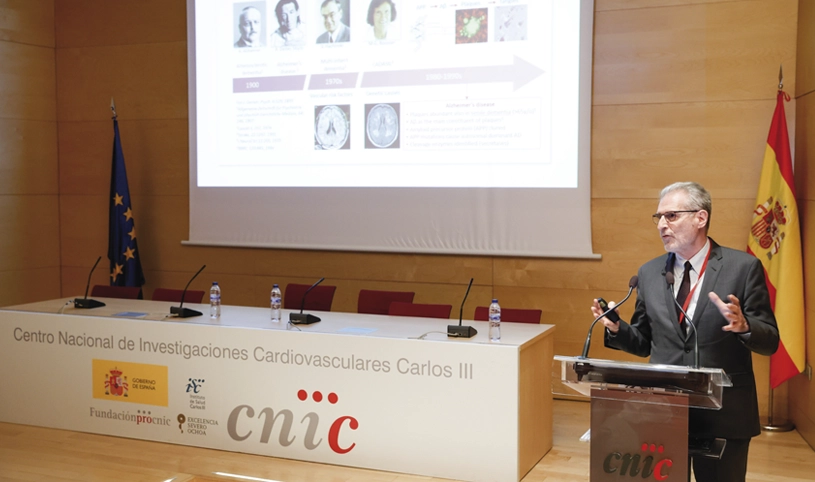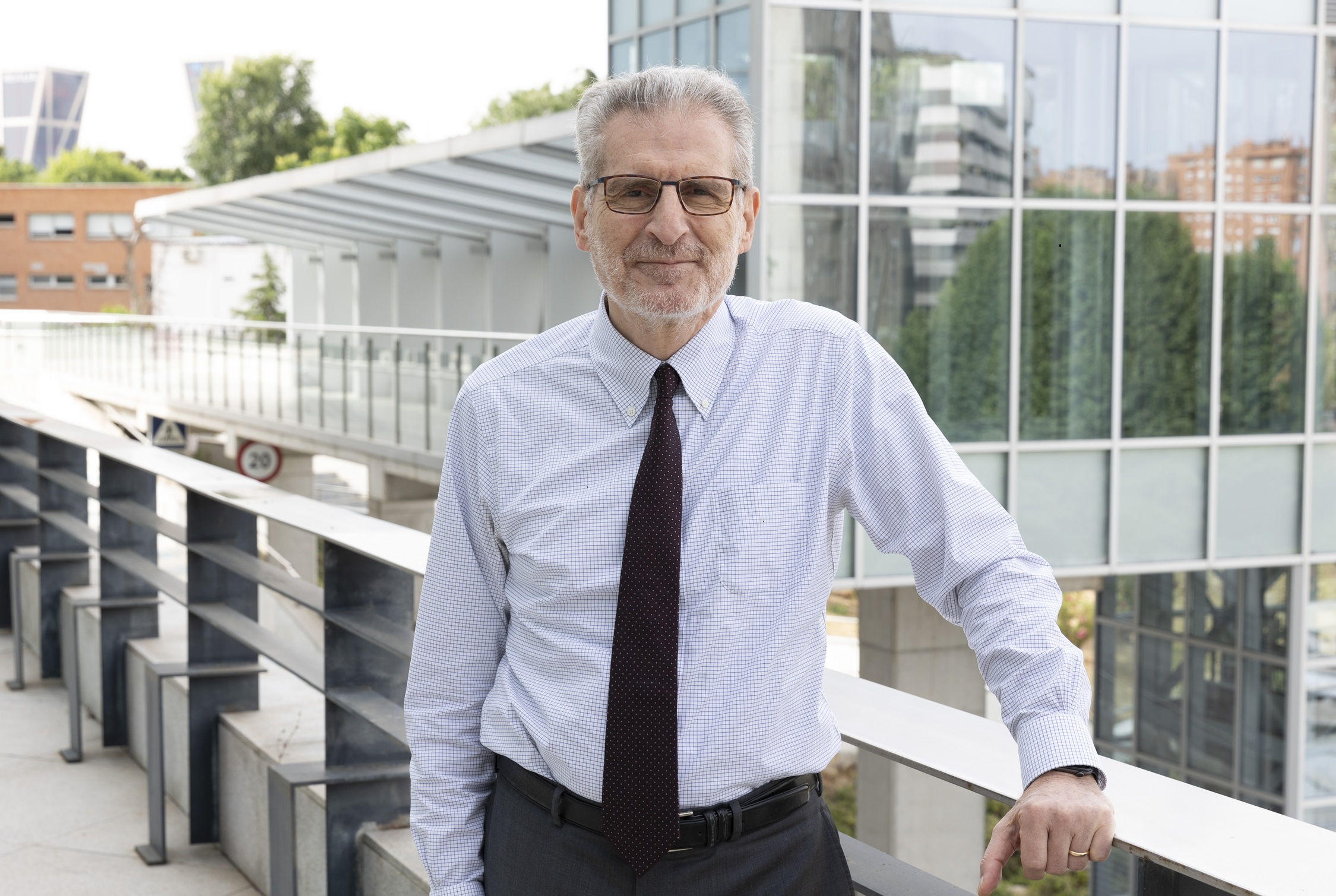Costantino Iadecola: “The idea is that alzheimer’s could have a vascular element was not part of our thinking”
Director of the Feil Family Brain and Mind Research Institute
Dr. Costantino Iadecol is Director and President of the Feil Family Brain and Mind Research Institute and Anne Parrish Titzell Professor of Neurology at Weill Cornell Medicine. His research focusses on the basic mechanisms of neurovascular function and on the molecular and cell abnormalities underlying ischaemic brain injury, neurodegeneration and other dysfunctions associated with cognitive deterioration. Dr. Costantino Iadecola, Director of the Feil Family Brain and Mind Research Institute at Weill Cornell Medical College, was one of the organizers of the CNIC Conference 2024: Cardiovascular Risk Factors and Brain Health. He co-organized the event alongside Valentín Fuster, General Director of the Spanish National Center for Cardiovascular Research (CNIC); María Ángeles Moro, Head of the Neurovascular Pathophysiology Laboratory at CNIC; and Marta Cortés Canteli, CNIC/Health Research Institute-FJD.
- Neurological diseases of the brain are on the increase more than any others in the world, and they are also the ones with the fewest therapeutic opportunities…
That’s right. To a large extent, this rapid growth is due to population ageing. Many of these neurological diseases are related with age, particularly the ones that affect cognition. As the population gets older, the incidence of these diseases increases. At the same time, there are no effective therapies for these conditions, which causes an increase in their prevalence. There are increasing numbers of people affected as they get older.
That’s why there is so much interest in understanding how to prevent the cognitive problems related with age and, if possible, how to treat them. For many years, neurological diseases have been the domain of neurologists. I am a neurologist myself.
Until recently, the role that vascular abnormalities played in these neurological diseases had not been considered, except in the case of stroke or other major disorders related with the brain’s blood vessels. The idea that Alzheimer’s could have a vascular element was not part of our thinking. In fact, the diagnostic criteria for Alzheimer’s did not include the possibility of a vascular problem. For instance, if someone had suffered a stroke, the possibility of Alzheimer’s was automatically ruled out. This created an erroneous perception of the disease. However, when you analyse the real situation, you see that the majority of people with cognitive deterioration in the community have a combination of diseases, like Alzheimer’s and vascular problems. Mixed dementia is the most common cause; it isn’t only Alzheimer’s or just vascular, it is a combination of the two
- So neurologists, physicians and scientists should change their way of thinking…
Exactly. For instance, if you go to a memory clinic, where many of these people end up going first, the physicians don’t even take your blood pressure. They only focus on the brain, without worrying about the rest of the body. This eliminates one of the most important factors contributing to dementia: blood pressure. There are other cardiovascular factors, such as cholesterol and diabetes that are also crucial.
The CNIC Conference brought together world experts who cover both intrinsic neural aspects of the brain and peripheral vascular aspects. We also have experts in epidemiology, who understand how diseases evolve in the population, and specialists in the immune system, whose role in these diseases is increasingly evident
Until recently, the role that vascular abnormalities played in these neurological diseases had not been considered, except in the case of stroke or other major disorders related with the brain’s blood vessels
- Maybe we should consider dementia as a disease that affects the whole body, not just the brain..
Exactly. This is a concept that the neurological community finds difficult to accept because we have been trained to focus only on the brain. We measure reflexes, not blood pressure. It is a change of paradigm we need to encourage, and we hope that the message resonates in the next generation. Today’s postdoctoral students are the people who will have greatest impact in the future.
We no longer have the mental flexibility to think of new ways to tackle these problems. For instance, someone asked Valentín Fuster about social networks. Our generation grew up with TV and films, but young people today think in terms of social networks, which is where things happen now. What your teacher at school says, what you watch on TV is not important anymore, it’s what your peers say.
In your teens, which is a critical period of life, you acquire certain habits that you maintain throughout your life. For instance, you remember that they taught you the importance of exercise and how to avoid being sedentary, which is an important risk factor for Alzheimer’s and high blood pressure.
- All of this is important for prevention, but the problem is that we don’t have effective treatments for these diseases. Could this change of paradigm lead us to new treatments or ways of finding treatments for dementia, not just Alzheimer’s?
Absolutely. But you have to understand that the field of dementia is closely linked to ageing.
Although we can’t control ageing, some people say we will live a lot longer…
Yes, but we aren’t made to live forever. Nevertheless, if we keep our body healthy, the impact of ageing will not be so severe.
Our generation grew up with TV and films, but young people today think in terms of social networks, which is where things happen now. What your teacher at school says, what you watch on TV, is not important anymore, it’s what your peers say
- You mentioned the importance of keeping the body young and avoiding risk factors....
Exactly, and the habits we acquire, like not smoking, are crucial. In the USA people smoke a lot less than here in Europe.

- It’s an enormous problem, particularly among young people…
That’s right, and many young people think that smoking or vaping doesn’t have consequences, which is a mistake. As Dr Fuster says, prevention strategies must begin at a very early age because risk is cumulative and also, when you are young, you are more likely to acquire good habits.
One of the most interesting aspects, but also one of the most depressing, is that the risk factors associated with blood vessels are more dangerous in middle age. When you already have memory or cognition problems, controlling blood pressure doesn’t make a big difference. What really helps is having controlled it 20 years previously. The ideal thing is to identify the risks as early as possible, to change our lifestyle or seek medical help
- In your opinion, do you think society and governments are receiving the messages and understanding the importance of controlling blood pressure and other factors? And society?
Society tends to react instead of being proactive. You can’t worry about controlling infections until there is a pandemic, for instance. The same thing happens with individuals. We don’t act until we realise that something is wrong. It would be ideal to have a healthy lifestyle as the norm.











